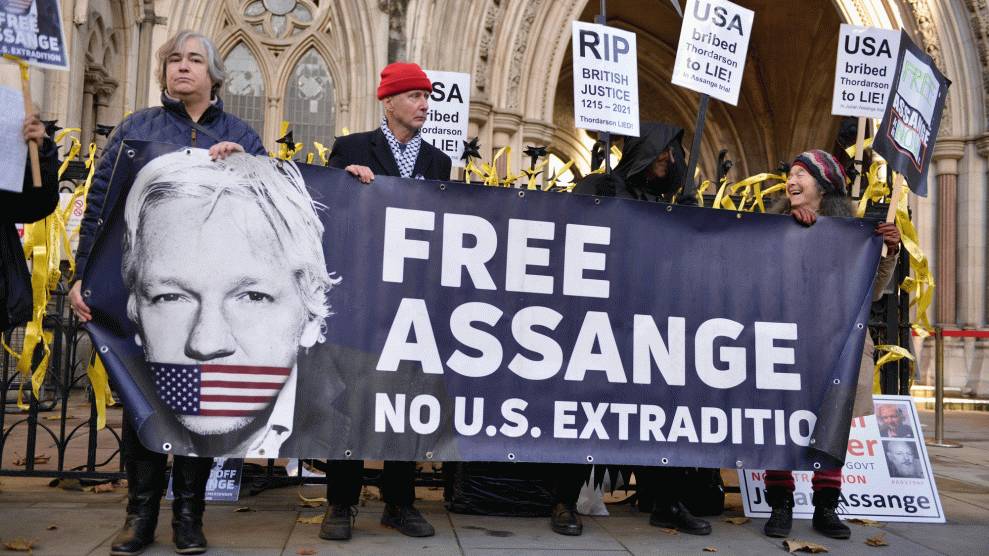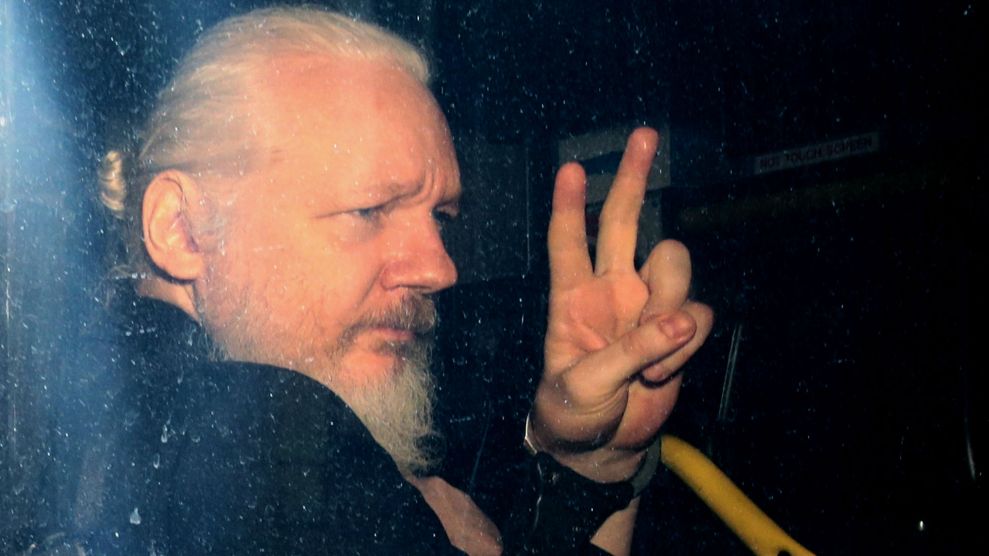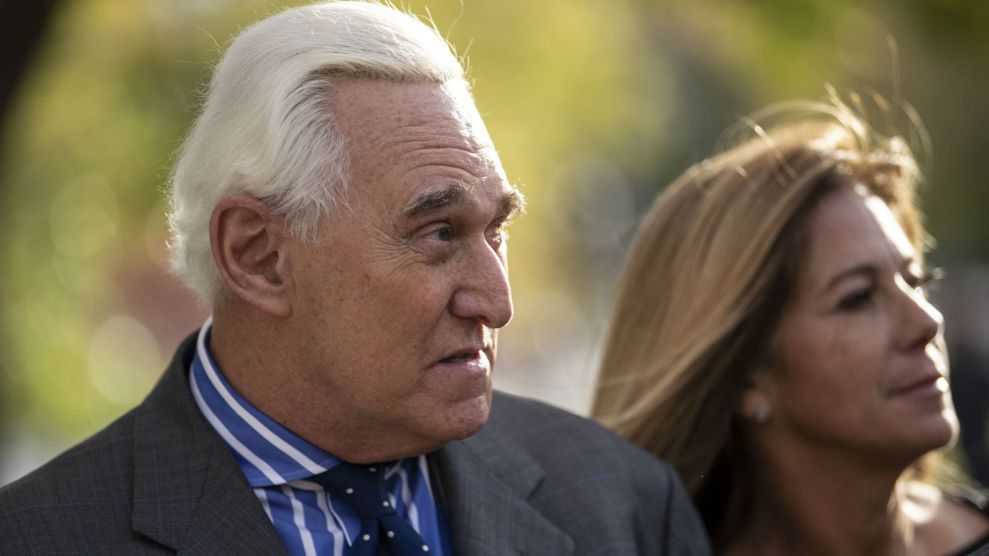
Demonstrators at the Royal Courts of Justice in London protest the possible extradition of WikiLeaks founder Julian Assange to the United States.Thomas Krych/AP
Editor’s note: This essay from David Corn first appeared in his new newsletter, This Land. Given the importance of the Assange case, we want to make sure as many readers as possible have a chance to see it. This Land is a newsletter written by David twice a week that provides behind-the-scenes stories about politics and media; his unvarnished take on the events of the day; film, books, television, and music recommendations; interactive audience features; and more. Subscribing costs just $5 a month—but right now you can sign up for a free 30-day trial of This Land here.
Julian Assange deserves condemnation. He doesn’t deserve extradition.
Last week, Assange, the founder of WikiLeaks who remains imprisoned in England, received bad news. A British judge ruled in favor of a US government request that Assange be extradited to the United States to face charges under the Espionage Act for having published classified diplomatic and military cables. This was a troubling development for anyone who cares about journalism and free speech.
The court decision was the latest turn in a long-running global legal battle. In April 2019, an indictment against Assange was unsealed in the United States. The charge was relatively minor: conspiracy to commit computer intrusion. The maximum possible sentence was five years imprisonment. It stemmed from his alleged effort in 2010 to help Chelsea Manning, then a US soldier, hack a classified database from which she obtained 750,000 secret military and State Department documents that she slipped to WikiLeaks. But weeks later the Trump administration further indicted Assange under the Espionage Act for having publicly posted the material WikiLeaks received from Manning. For that, he faces up to 170 years in prison.
This prosecution poses a serious threat to democracy. I’ll turn to that in a moment. But one PR problem with the case is that Assange is a highly unsympathetic character, for he is partly responsible for the damage done by Donald Trump during his presidency: 400,000 or more preventable deaths of Americans in the COVID-19 pandemic; the lack of action to address climate change; the promotion of disinformation and lies to incite a violent attack on the US Capitol; a tax cut that favored the wealthy and added to the national debt; right-wing appointments to the Supreme Court that could lead to the severe curtailing of reproductive rights for women; the spread of bigotry and racial hatred; the suppression of voting rights; cutbacks in government health programs; creeping (or galloping) authoritarianism; and so much more.
The United States has suffered greatly because of Assange. In 2016, he collaborated with the Russian attack on the US election to help Trump win. As has been detailed by several government investigations—including in special counsel Robert Mueller’s final report and in a bipartisan report issued by the Senate Intelligence Committee last year—after Russian intelligence teams hacked Democratic targets, they passed the stolen emails and documents to WikiLeaks, which then publicly disseminated the material.
The Senate report notes that Assange’s group “timed its document releases for maximum political impact.” That is, WikiLeaks wasn’t acting in a noble information-sharing manner. It sought to weaponize the information pilfered by Vladimir Putin’s operatives to cause harm to candidate Hillary Clinton, whom Assange and WikiLeaks had disparaged as a “sadistic sociopath” and a threat to the world. (“We believe it would be much better for [the] GOP to win,” WikiLeaks had tweeted.)
In disseminating the stolen information, WikiLeaks behaved more as a political hit squad than a media organization. For example, when the Washington Post on October 7, 2016, published the Access Hollywood video showing Trump bragging about grabbing women “by the pussy,” half an hour later WikiLeaks began releasing emails Russian hackers had swiped from John Podesta, the chair of Hillary Clinton’s campaign. This was a counterblow, an attempt to rescue Trump with a distraction. And to inflict the most pain it could on the Clinton campaign, WikiLeaks did not dump all the Podesta information at once (as it had done with its previous release of Democratic Party material at the start of the Democrats’ convention that July). Instead, the group doled out the documents in batches, almost daily, to ensure there would be a steady stream of negative Clinton stories for the final four weeks of the campaign. Assange and WikiLeaks were full partners with Putin in a plot aimed at electing Trump president.
And Assange tried to cover up Russia’s role in this perfidious operation. As the Senate report states:
Assange and WikiLeaks undertook efforts to obscure the source of the stolen emails, including through false narratives. Assange’s use of such disinformation suggests Assange possibly knew of and sought to hide Russian involvement. One narrative from Assange involved a conspiracy theory that Seth Rich, a DNC staffer killed in a botched robbery, was the source of the DNC email and had been murdered in response. On August 9 [2016], Assange gave an interview on Dutch television implying that Rich was the source of the DNC emails, and that day WikiLeaks announced that it would be issuing a reward for information about Rich’s murder. In a subsequent interview, Assange commented about the WikiLeaks interest in the Rich case as concerning “someone who’s potentially connected to our publication.” The Committee found that no credible evidence supports this narrative.
Assange was pushing a baseless and odious conspiracy theory (which caused tremendous distress for Rich’s family) that was also being championed by conspiracy nutter Alex Jones, Fox News’ Sean Hannity, and Russian intelligence. His apparent goal was to hide the Kremlin’s role in the pro-Trump/anti-Clinton hack-and-leak scheme that WikiLeaks was facilitating. This is not how a legitimate news organization functions. (By the way, the Senate report also issued this indictment of the Trump campaign: “The Trump Campaign publicly undermined the attribution of the hack-and-leak campaign to Russia and was indifferent to whether it and WikiLeaks were furthering a Russian election interference effort.” That is, Trump and his crew aided and abetted Moscow’s attack on the 2016 election.)
Assange and WikiLeaks connived and lied to help Trump vanquish Clinton. The Podesta information dumps were a steady drag on the Clinton campaign in the final stretch, often preventing it from gaining traction for its own messages and themes. These releases also served as a constant reminder to the public of her own email controversy—and as an effective setup for the last-minute revelation from then–FBI Director James Comey that the bureau might have unearthed missing or previously destroyed Clinton emails. (It hadn’t.)
Given how close the election ended up, the Russia-WikiLeaks operation was one of several factors that determined the outcome. Remove Putin’s hackers and Assange’s outfit from the picture, and Clinton probably would have won. (Ditto for Comey’s move, as well as for Clinton’s own decision not to do more in several swing states in the last week.) Assange can (proudly?) claim a degree of ownership of the election results. That means he also partly owns what came afterward. He and WikiLeaks opposed Clinton, they contended, because she was a warmonger. There is no way of telling whether she would have started any wars had she been president. But it’s a damn good bet that had she been in charge during the pandemic, far fewer Americans would have perished.
Assange ought to be punished—if only ostracized and widely denigrated—for his 2016 skullduggery. But the extradition case at hand does not address that. Focused on an earlier episode, it is an excessive use of legal force by the US government—first the Trump administration and now the Biden administration. The Obama administration considered charging Assange for releasing the Manning material under the Espionage Act—which was intended to be used against spies and their collaborators—but it was concerned about a negative impact on journalists. Obtaining and publishing classified documents—and asking sources to provide such material—is a common activity for many news organizations.
When Assange was indicted on these espionage charges, John Demers, then the head of the Justice Department’s National Security Division, said Assange was “no journalist.” Given Assange’s underhanded partnership with Russian intelligence, that may well be an accurate statement. But the actions for which he has been indicted under the Espionage Act are the actions of reporters. And media organizations are correct to worry about a precedent being established. (Most Espionage Act cases have involved government employees who leaked classified information.) As the New York Times reported at the time of the Assange indictment, “Notably, The New York Times, among many other news organizations, obtained precisely the same archives of documents from WikiLeaks, without authorization from the government—the act that most of the charges addressed… [I]t is not clear how that is legally different from publishing other classified information.”
Media outlets and free speech advocates have justifiably howled about this case. Kenneth Roth, the executive director of Human Rights Watch, noted, “The Assange prosecution threatens these basic elements of modern journalism and democratic accountability.” And the Committee to Protect Journalists last week issued this statement: “The U.S. Justice Department’s dogged pursuit of the WikiLeaks founder has set a harmful legal precedent for prosecuting reporters simply for interacting with their sources. The Biden administration pledged at its Summit for Democracy this week to support journalism. It could start by removing the threat of prosecution under the Espionage Act now hanging over the heads of investigative journalists everywhere.”
Considering all the devastation Assange enabled with his 2016 plot against America, it is tough to embrace him as a free-speech martyr. But those who care about accountability and excessive government power don’t always get to choose the battles that must be waged to preserve First Amendment freedoms. Assange mounted a damaging attack on the United States and facilitated a profound subversion of its political system. Still, his prosecution under the Espionage Act is another assault on American democracy.
Assange’s attorneys say they will appeal the decision, which calls for a lower court to send the case to the British home secretary for a decision on whether Assange ought to be extradited. Meanwhile, Assange will remain in Belmarsh Prison in London. He spent almost seven years in the Ecuadorian embassy in London, ducking extradition to Sweden for a sex crimes case, which was dropped in 2015; he was arrested in 2019 related to bail-skipping charges and the extradition warrant from the United States.
Assange did help put in the White House a wannabe authoritarian who demonized reporters and dangerously claimed the media was the “enemy of the people.” (And the ingrate paid Assange back by indicting him.) Yet now his personal fate is tied to the protection of First Amendment rights. The Biden administration ought to drop Espionage Act case against Assange—not for his sake, but for the rest of us.












